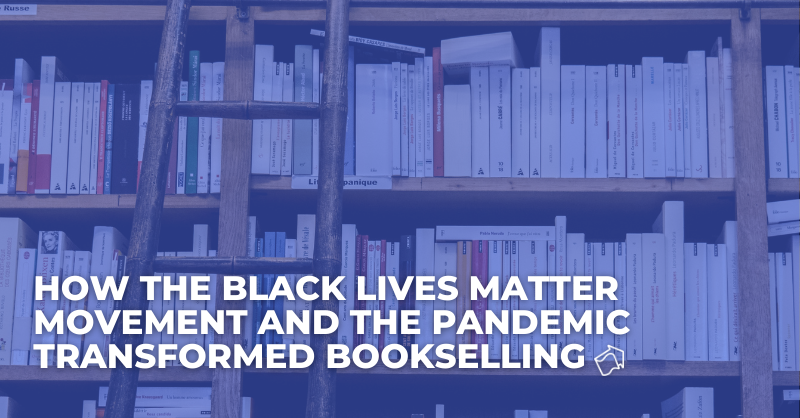State of the Industry Blog Series:
How the Black Lives Matter Movement and the Pandemic Transformed Bookselling
In our new “State of the Industry” blog series, we’re breaking down how the pandemic has transformed the publishing industry. By understanding how the industry has rapidly transformed in 2020 and 2021, writers and authors will be better prepared to navigate the new state of the industry in 2022.
Last month, we explored how the pandemic impacted indie bookstores, and whether or not Bookshop.org “saved” indies.
Now it’s time for a new question: How did the Black Lives Matter movement impact indie bookstores? And how are indies doing today?
Answer: BLM boosted indie bookstore sales in a surprising way. Bookstores fared better than expected during the pandemic, but they are still struggling.
The murder of George Floyd on May 25, 2020 sparked outrage against racially motivated police violence, spawning mass protests and a highly visible reckoning with racism that swept America, and the globe. The “Black Lives Matter” movement (also known as “BLM”) inspired active discussion about race, racism, anti-racism, white privilege, and allyship that reverberated from the streets to The White House to the world — and was felt clearly among publishers and booksellers.
In June 2020, The New York Times reported that “As Americans grapple with the country’s history of racism, many of them have turned to books, propelling titles like “How to Be an Antiracist” by Ibram X. Kendi and “So You Want to Talk About Race” by Ijeoma Oluo to the best-seller lists.”
The article also reported that some bookstores, especially Black-owned stores like Semicolon Bookstore in Chicago, saw a “huge financial boost,” with sales rising from 3,000 books per week to 50,000 books per week. Store owner Danni Mullen estimated that at least half of her store’s income resulted from “the 10 or so race-related books dominating best-seller lists.”
By May of 2021, the general consensus was that indie bookstores had not suffered as much as had originally been projected at the beginning of the pandemic.
Booksellers experienced a surprisingly strong holiday season in December 2020 that, coupled with other unexpected boosts like the sales resulting from the BLM movement, helped keep many stores open at the start of 2021. Booksellers reported a huge boost in online sales in 2020 and 2021, compared to previous years. Paycheck Protection Program (PPP) loans enabled some store owners to meet their payrolls. Bookshop.org directed more than $14 million to indies in revenue as of May 2021.
There was also arguably more awareness of and support for “supporting local” businesses like indie bookstores than ever, due to the economic pressures of the pandemic.
However, indie stores were (and are) still struggling. Bookstore sales fell 30 percent overall in 2020 according to the US Census Bureau. While BLM gave a huge financial boost to some stores, those bestselling titles did not dominate sales in the same way as time went on.
Stores were operating on the same limited budgets, but were combatting higher costs that were unimaginable two years ago: Personal Protective Equipment (PPE), hazard pay, postage, extra cleaning and sanitizing products, etc. Bookstore staff had to work hard to ship books and reorganize/sanitize stores. With reduced income and population capacity in-store, these challenges demanded more of the remaining staff.
As of October 2020, in-store foot traffic was still way down, and it was hurting revenue. Some stores (especially those in NYC) were hit hard by the fact that a substantial portion of their customer base were tourists, who were no longer visiting in the same capacity.
As of May 2021, profits were still down for indie stores, according to the Associated Press. In-store events had not returned to pre-pandemic levels. And despite the influence of Bookshop.org, Amazon still commands a hefty share of the book market.
Without a doubt, the pandemic transformed bookselling in a variety of ways: Booksellers, authors, and customers got a crash course in how to approach sales and events virtually; Bookshop.org proved to be a noteworthy competitor for Amazon; and the Black Lives Matter movement helped open publishers’ eyes to the sales potential of their backlists.
While some bookstores will return to some semblance of pre-pandandemic “business as usual,” the events of 2020 and 2021 have certainly changed how booksellers, authors, and readers understand and approach bookselling as a whole.
And it’s not just the publishers and booksellers who have changed — readers themselves, and their reading habits, have transformed as well.
We’ll explore this in more detail in our next blog: How the Pandemic Transformed Readers and Consumer Habits.

Chelsea is a copywriter, editor, publicist, and content creator at Books Forward, an author publicity and book marketing firm committed to promoting voices from a diverse variety of communities. From book reviews and author events, to social media and digital marketing, we help authors find success and connect with readers. Interested in what’s possible for your book sales and building readership? Check out our services, tell us your goals, and get a customized publicity campaign tailored just for you.


